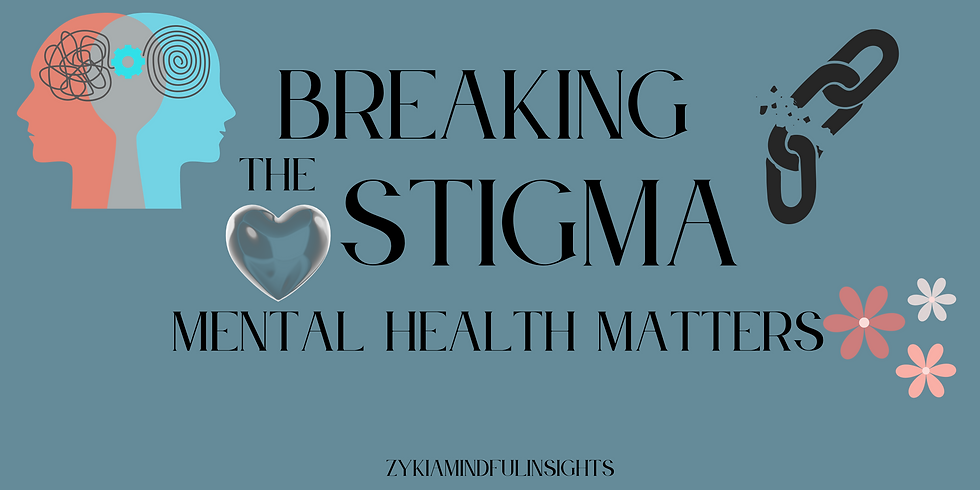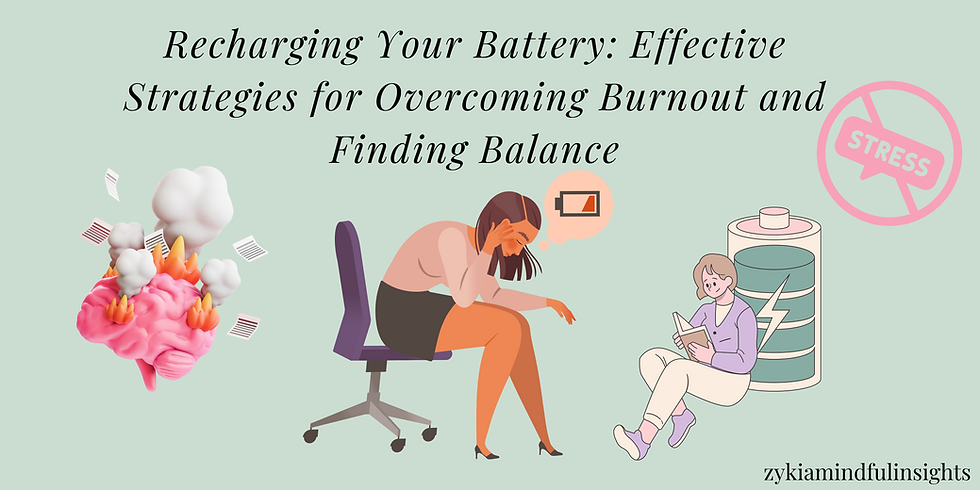Breaking the Stigma around Mental Health
- Zykia Hannah

- Feb 6, 2024
- 6 min read

In a world where silence often shrouds the struggles we face, breaking the stigma around mental health becomes an imperative journey towards healing and understanding. This blog aims to unravel the misconceptions, fostering a space where openness is embraced and empathy flourishes. Through shared narratives, insightful discussions, and evidence-based insights, we embark on a mission to dismantle the barriers that surround mental health conversation's. It's time to challenge societal norms, replacing judgement with compassion and ignorance with knowledge. Join us in this transformative exploration, as we collectively work towards exploration, as we collectively work towards a more compassionate and enlightened perspective on mental well-being.
Before we get started with the next part, I had included a few quick facts about Breaking the Stigma around Mental Health :
Prevalence - Mental health issues affect one in four individuals globally, highlighting the widespread impact that breaking the stigma can have on countless lives.
Economic Burden - The global costs of untreated mental illness is staggering, emphasizing the need for open conversations to reduce this burden on both individuals and society.
Productivity Boost - Companies fostering mental health support witness enhanced productivity, emphasizing the positive impact of breaking the stigma in the workplace.
Youth Focus - Addressing mental health stigma is crucial for youth, as 75% of mental health issues develop before the age of 24, emphasizing the importance of early intervention.
Global Movement - A growing global movement is challenging stereotypes and promoting mental health awareness, showcasing the collective power to transform societal attitudes.
In a world where invisible battles are fought daily, the pervasive stigma surrounding mental health often exacerbates the challenges individuals face. Breaking this stigma is not just a noble cause but a necessity for fostering a compassionate and supportive society. By unraveling the layers of misunderstanding and misinformation, we pave the way for empathy and understanding.
Understanding the Stigma :
Mental health stigma arises from misconceptions, fear, and societal norms that cast shadows over the struggles many silently endure. it manifests as discrimination, prejudice, and a reluctance to discuss mental health openly. Recognizing and dissecting these stigmas is the first step forwards creating an environment where individuals feel safe to share their experiences without fear of judgement.
Power of Personal Narratives :
The transformative power of personal narratives cannot be overstated. Sharing stories of resilience, recovery, and coping mechanisms not only humanizes mental health challenges but also empowers others to speak out. These narratives connect individuals on a profound level, breaking down the isolating walls built by stigma, and fostering a sense of community and understanding.
Educating for Empathy :
Education is a formidable tool in dismantling mental health stigma. By providing accurate information about mental health conditions, debunking myths, and promoting understanding, we equip individuals with the knowledge needed to navigate conversations and support those in need. Knowledge fosters empathy, and empathy is a cornerstone in breaking down the barriers that stigma erects.
Championing Workplace Mental Health :
The workplace, often a hub of stress and pressure, is a critical arena for dismantling mental health stigma. Encouraging open discussions, implementing mental health policies, and fostering a supportive work environment not only benefit individual employees but also contribute to increased productivity and overall workplace well-being.
Global Collaboration for Change :
Breaking the stigma around mental health is not a solitary endeavor but a global movement gaining momentum. Organizations advocates, and communities worldwide are joining forces to challenge societal norms, reshape narratives, and emphasize the importance of mental well-being. This collaborative effort reinforces the idea that breaking the stigma is not just an individual responsibility but a compassionate and inclusive world.
In concluding this exploration into breaking the stigma around mental health, let us envision a world where compassion triumphs over judgment and understanding eclipses ignorance. Each shared story, every open conversation, and the collective effort to dispel myths contribute to a transformative shift in societal attitudes. Breaking the stigma is not merely to call to action; it's a commitment to fostering empathy, dismantling barriers, and cultivating a culture that embraces the nuances of mental well-being. As we continue this journey together, let it be a testament to our shared dedication to creating a world where individuals feel empowered to seek help without fear, where conversations about mental health are met with compassion, and where the strength to overcome challenges is celebrated rather than stigmatized. May the path we tread inspire others to join in, ensuring that the light we cast mental health dispels the shadows of stigma for generations to come.
In this next part I will be giving some tips, resource's, and also I will be talking about some myths and facts about Breaking the Stigma around Mental Health. I decided to include this next part, because I feel like it will be useful for someone that wants to know more about this topic.
Practical Tips that you might need :
Start Conversations - Encourage open discussions about mental health in your circles. By initiating conversations, you create a space where others feel comfortable sharing their experiences.
Educate Yourself - Stay informed about mental health conditions, treatments, and available resources. Knowledge equips you to change stereotypes and misinformation.
Challenge Stigmatizing Language : Be mindful of the language you use and challenge stigmatizing remarks when you encounter them. Language plays a crucial role in shaping perceptions.
Share Personal Stories : If you feel comfortable, share your own experiences with mental health. Personal narratives are powerful tools for humanizing and normalizing mental health challenges.
Supportive Listening : Practice active and empathetic listening when someone confides in you about their mental health. Provide a non-judgement space for them to express themselves.
Resources :
National Alliance on Mental Illness (NAMI) - NAMI offers a wealth of resources, including support groups, educational materials, and helplines. Their website is a valuable hub for information and assistance.
Mental Health America (MHA) - MHA provides a range of resources, from screening tools to articles on various mental health topics. Their advocacy work contribute to breaking the stigma.
Psychology Today - Psychology Today's website includes articles, expert insights, and a therapist directory. It's a comprehensive resource for mental health information and finding professional help.
Mind Your Mind - Mind Your Mind is an organization that focuses on youth mental health. Their resources include interactive tools and creative approaches to breaking the stigma.
Time to change - This UK-based campaign provides resources for individuals, workplaces, and schools to challenge mental health stigma. Their website offers toolkits and practical advice.
Local Mental Health Services - Research and share information about local mental health services and hotlines available in your area. Knowing where to turn for help is crucial for breaking down barriers.
Books and Documentaries - Recommend books, documentaries, or films that address mental health issues in a sensitive and informative manner. These can be powerful tools for fostering understanding.
Mental Health First Aid Training - Consider participating in Mental Health First Aid training. This program teaches individuals how to provide initial support to someone experiencing a mental health crisis.
By incorporating these practical tips and sharing reliable resources, you contribute actively to breaking the stigma around mental health in your community and beyond.
Myths vs. Facts about Breaking the Stigma around Mental Health :
Myth 1 : Talking about mental health makes it worse.
Fact : Open conversations foster understanding, reduce isolation, and encourage seeking help. Silence often perpetuates stigma, making it crucial to break the barriers through dialogue.
Myth 2 : Mental health issues are a sign of weakness.
Fact : Mental health challenges are complex and can affect anyone, regardless of strength or character. Seeking support demonstrates courage and resilience.
Myth 3 : Only "serious" conditions deserve attention.
Fact : All mental health concerns are valid and deserve attention. Breaking the stigma involves acknowledge the spectrum of mental health experiences without judgment.
Myth 4 : People with mental health issues are violent.
Fact : The vast majority in individuals with mental health conditions are not violent. Sensationalizing this stereotype contributes to discrimination and stigma.
Myth 5 : Mental health is just a phase; people can snap out of it.
Fact : Creating a stigma-free environment is a collective effort. Society plays a crucial role in supporting individuals and fostering understanding.
Myth 6 : Mental health is just a phase; people can snap out of it.
Fact : Mental Health conditions are real, lasting, and often require professional support. Minimizing struggles may hinder individuals from seeking the help they need.
Myth 7 : Only "crazy" people go to therapy.
Fact : Therapy is a valuable resource for anyone dealing with life's challenges. It provides tools for coping, self-discovery, and maintaining mental well-being.
Myth 8 : Mental health conversations are private and shouldn't be shared.
Fact : Sharing experiences reduces stigma and helps others feel less alone. Open conversations challenge stereotypes and contribute to a more supportive society.
Myth 9 : Positive thinking can cure mental health issues.
Fact : While a positive mindset is beneficial, it's not a cure-all. Mental health conditions often require a holistic approach, including therapy, medication, and support.
Myth 10 : Mental health issues only affect certain demographics.
Fact : Mental health knows no boundaries; it impacts people of all ages, genders, races, and socioeconomic backgrounds. Breaking the stigma requires recognizing its universal reach.
That's it for today's post. I hope you have learned some new things about today's topic. I really enjoyed doing this topic. As I was doing my research I was learning a lot of new things myself.
🫧Quote of the day :
"Mental health is not a destination, but a process. It's about how you drive, not where you're going." - Noam Shpancer, PhD




I am all about fighting stigma on mental illness and addiction sadly stigma stops alot of people from getting help love to see it stopped ✋️